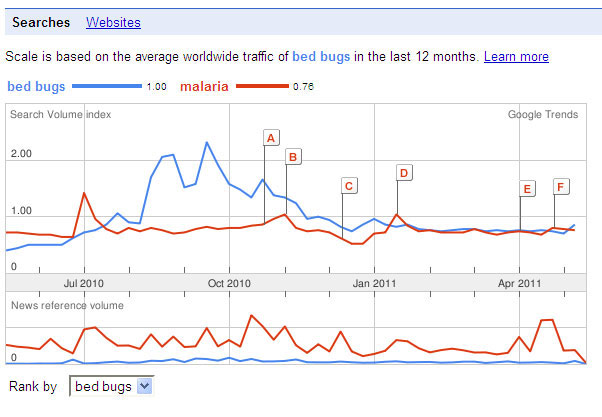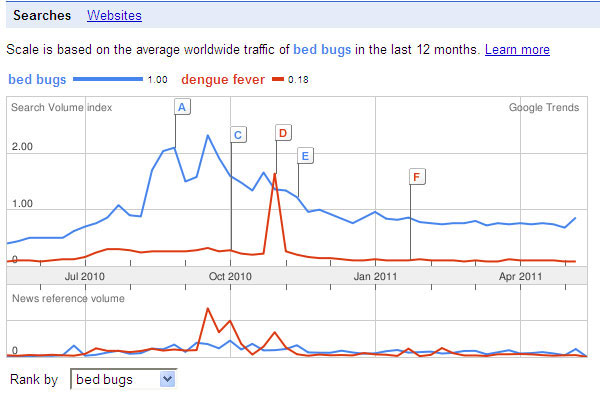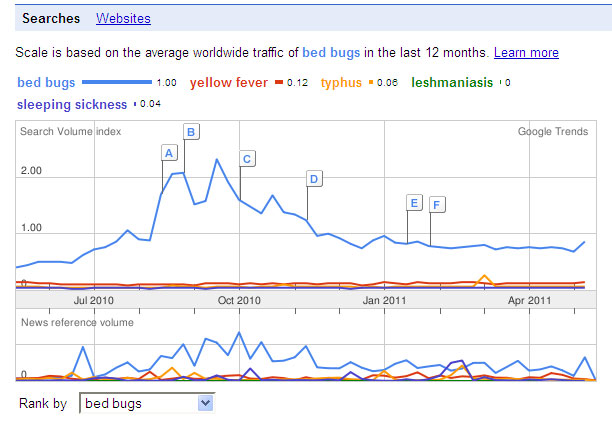
Ryan Fleacrest sometimes hangs with Michael Bubonic
Normally I have a bit of fun with Tuesday Tunes, whether mocking sugary pop music or giving props for mad entomological rhymes. Today however, I want to share a few trends which are both topical and disheartening (don’t worry, I still have a great song for you at the end of the post).
Last week, a report came out of Vancouver in which doctors reported bed bugs harbouring antibiotic resistant bacteria (Staphylococcus aureus [MRSA] and Enterococcus faecium [VRE]). While it’s a scary proposition, it’s unknown whether the bed bugs are capable of transferring the bacteria at this point. As Jonathan Eisen points out, it shouldn’t be too much of a surprise that MRSA was found; bed bugs are ectoparasites and MRSA is primarily a skin/wound-related infection. In fact, bed bugs have never been shown to transmit diseases (bacterial or viral) despite plenty of research attention, and as far as I can tell, have never been implicated in a human death. More people have died from improper handling and use of pesticides intended to kill bed bugs than from the bed bugs themselves!
Now don’t get me wrong, the idea of a “true bug” creeping around your mattress and having a late night snack is pretty gross (even for an entomologist), but other than some itchy bites and the financial burden of replacing your furniture, there’s not much to worry about. That doesn’t stop people from caring more about these blood-suckers than insect-transmitted diseases which are literally killing millions of people annually though.
Let’s take a look at a few comparisons between interest in bed bugs and some of the more important insect-vectored diseases using Google Trends, starting with malaria:
For most of the last year, more people have inquired about bed bugs than malaria, a disease which infects more than 500 million people and which kills ~1 million people per year. You might notice the peak labeled “D” where malaria topped bed bugs; that’s when George Clooney revealed he had contracted malaria on a recent trip to Africa. Is anyone else troubled by this?
Unfortunately, it only gets worse as we check other insect-vectored diseases.
Although not as deadly, Dengue fever infects ~50 million people annually (killing ~25,000/yr), but threatens 2.5 BILLION people in more than 100 countries around the globe. Again, peak “D” indicates when world champion surfer Andy Irons died of the disease.
Yellow fever (200k infected/30k deaths per year), typhus (16 million infected/600k deaths per year), leshmaniasis (2 million people infected) and sleeping sickness (estimated 50-70k infected/ 48k deaths in 2008) don’t even register on the public’s radar in comparison to bed bugs. For a little perspective, these 4 diseases affect nearly 19 million people globally, which is comparable to the population of Florida (source). Apparently Hollywood has yet to contract one of these ailments…
What can you do to help? Why not consider donating to a charity helping those affected by these diseases! The Bill & Melinda Gates Foundation is a major supporter of malaria prevention and research programs, and has links to many organizations where you can donate. Canadians might be familiar with Rick Mercer’s campaign to get insectide-laden bed nets to African families. The Belinda Stronach Foundation has continued the charge, and for $10 you can provide a bed net and help prevent the spread of malaria in sub-Saharan Africa! If you can’t afford to donate right now, please share these links with friends & family and help bring these important diseases some much needed attention.
Now I promised you another entomological song, and it’s about time I delivered. So here it is, The Bed Bug Song by George Cahill!
Remember don’t let the bed bugs bite! Or the mosquitoes, or the sand flies, or the tsetse flies, or the fleas, or the assassin bugs…
The Bed Bug Song is available on iTunes – Bed Bug Song – Hero Infection and yearly deaths from insect-vectored diseases courtesy of Wikipedia.H/T to Jennifer Brown & @_modscientist_ for the tips on malaria charities!




There are real issues of poverty and mental health in bedbug infestations that you are trivializing for the sake of some cheap laughs. I and a number of my friends, all living with mental health issues and on limited income have had infestations and I can tell you it is not funny at all. In fact for some bipolar and schizophrenic friends an infestation has seriously affected their psychoses and delayed treatment both for their mental illness and the infestation.
I suggest, since you are an entomologist, it ought to be a career move for you to seek a deliberate bedbug infestation, for scientific purposes. Not some lab controlled bug-in-a-beaker experience but a real out of control home infestation where there is a real risk of spreading them to friends and neighbours, with the creep factor of having your entire home and belongings scrutinized and treated. No vikane treatment allowed, just the common treatments using pyrethrins and heat. But let them proliferate for about 6-8 months first before treatment, you know, to simulate a poor person’s distracted procrastination.
Then blog post on your months long experiences and we’ll see how you feel about the importance of bedbugs in a public health debate.
Hi Jimmy,
I agree with you that a bed bug infestation is no laughing matter, but I don’t feel I made a joke about it here. I admit that I didn’t consider how stressful an infestation may be for someone with mental health issues, and how this might be extremely detrimental to their well-being, and for that I apologize.
The purpose of this article was not to minimize the impact that bed bugs have on society, but rather to call attention to several other insect-vectored diseases which I feel are ultimately a greater threat and underrepresented in public discussion. I hope that you and your friends who have been affected by bed bug infestations have been able to successfully eradicate them, and hope that you don’t face that burden again in the future.
If these vector-borne diseases were affecting populations with Internet access rather than underprivileged cultures with no political will the Google trends would be, you know, different. It’s too much to expect people to neurotically troll the web for information on parasites which don’t (yet) affect them much. Back when West Nile got bigger press it probably performed pretty well in terms of search engine popularity.
I totally agree the reason that most people are oblivious to these diseases is because they aren’t personally affected. That doesn’t change the impact that these insect-borne maladies have on populations in high-risk areas however, and trying to raise awareness of these diseases in the general populace is the only way in which long-term solutions can be found. Very few people in Western countries are personally affected by genocide in Sudan or drought and starvation in sub-Saharan Africa, but through celebrity endorsement these issues have received lots of attention in recent years, and I’d assume increased funding because of it. I hope one day that these insect-related diseases will receive the same sort of attention.
Well said, but personally I don’t see a high correlation between bed bugs and any of the diseases examined.